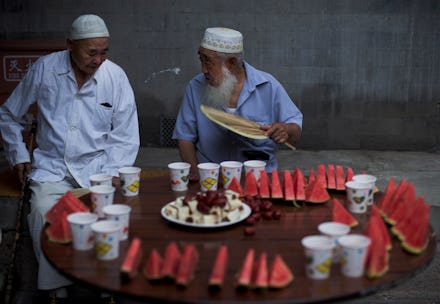China’s Newest Crackdown Is Targeting a Massive Religious Tradition

The news: For the latest display of institutionalized religious censorship, look no further than China's Xinjiang region during this Islamic holy month of Ramadan.
Over the past several days, schools, government agencies and local party organizations in Xinjiang posted statements on their websites banning students and civil servants from fasting in observance of religious holiday. The effort is part of the government's crackdown in which officials are trying to mitigate "an upsurge in militant violence," according to Reuters.
What about religious freedom? The crackdown effort leaves no ambiguity. Officials claim they are hoping to protect students' well being by preventing schools and government agencies from promoting religion.
"No teacher can participate in religious activities, instill religious thoughts in students or coerce students into religious activities," one statement read.
The root cause of the ban is the escalating violence in the region. According to TIME, China has been on a "yearlong anti-terrorism crackdown" in the Xinjiang region after a series of "brutal attacks" that the Chinese government attributes to Muslim religious extremists allegedly associated with Uighur Muslims.
On May 22, four people threw bombs into a market in the Xinjiang's capital of Urumqi, killing themselves and 39 others. Just a month later, police killed 13 attackers who drove into a police station and set off bombs that resulted in injuries of three policemen.
On June 30, China charged four "knife-wielding militants" from Xinjiang for a planned attack in a railway station where 29 people were killed and 140 were injured. During that March attack, police officers killed four other assailants involved.
Following these incidents, law enforcement have been tightening their reign. In just the month of June, police arrested 380 people and the courts have now decided to publicly sentence attackers.
The violence blame game: While China's leaders blame religious extremists from Xinjiang for all the attacks, the Uighur' actions may be a reaction to the broader societal trends affecting their lives in the region.
Xinjiang has experienced an influx of migrants settle in the region from other parts of the country. The Muslim community faces discrimination in the professional world as well as restrictive policies that limit their right to express themselves through prayer or dress.
The ruling party of the region is worried that religious activities will propel an opposition movement stemming from these communities.
The takeaway: If China does, in fact, want to pacify the nation, this is the wrong way to go about it.
Chinese authorities maintain that religion and education should be separated. Though this is not the first incidence where Chinese authorities have tried to ban fasting during Ramadan or repress religious freedoms on the Uighur Muslims of the region. However, "this year is unusually sensitive because Xinjiang is under tight security following attacks that the government blames on Muslim extremists with foreign terrorist ties," reports the AP.
By enacting such extremist policies like banning Muslims from fasting during a holy month, the Chinese government is doing more harm than good. Their intention may be to "protect students," but in the meantime they are fueling widespread dissatisfaction with the ruling party and provoking unrest.